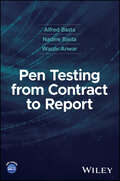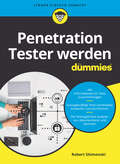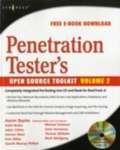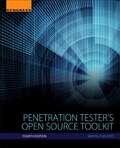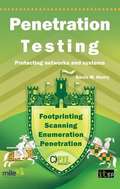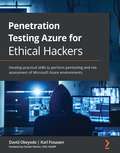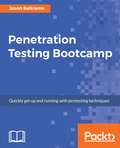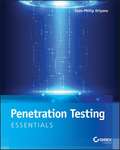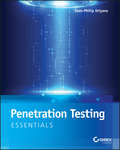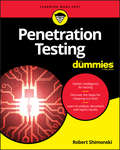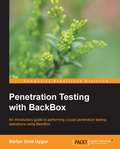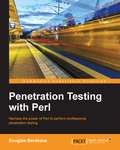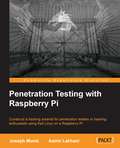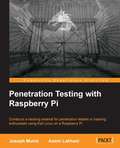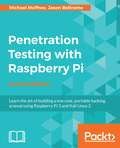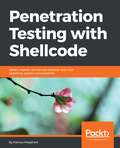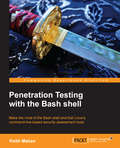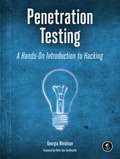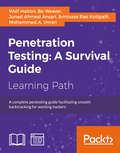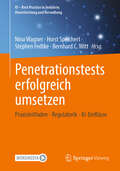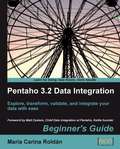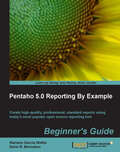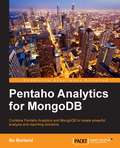- Table View
- List View
Peer-to-Peer: Harnessing the Power of Disruptive Technologies
by Andy OramThe term "peer-to-peer" has come to be applied to networks that expect end users to contribute their own files, computing time, or other resources to some shared project. Even more interesting than the systems' technical underpinnings are their socially disruptive potential: in various ways they return content, choice, and control to ordinary users.While this book is mostly about the technical promise of peer-to-peer, we also talk about its exciting social promise. Communities have been forming on the Internet for a long time, but they have been limited by the flat interactive qualities of email and Network newsgroups. People can exchange recommendations and ideas over these media, but have great difficulty commenting on each other's postings, structuring information, performing searches, or creating summaries. If tools provided ways to organize information intelligently, and if each person could serve up his or her own data and retrieve others' data, the possibilities for collaboration would take off. Peer-to-peer technologies along with metadata could enhance almost any group of people who share an interest--technical, cultural, political, medical, you name it.This book presents the goals that drive the developers of the best-known peer-to-peer systems, the problems they've faced, and the technical solutions they've found. Learn here the essentials of peer-to-peer from leaders of the field:Nelson Minar and Marc Hedlund of target="new">Popular Power, on a history of peer-to-peerClay Shirky of acceleratorgroup, on where peer-to-peer is likely to be headedTim O'Reilly of O'Reilly & Associates, on redefining the public's perceptionsDan Bricklin, cocreator of Visicalc, on harvesting information from end-usersDavid Anderson of SETI@home, on how SETI@Home created the world's largest computerJeremie Miller of Jabber, on the Internet as a collection of conversationsGene Kan of Gnutella and GoneSilent.com, on lessons from Gnutella for peer-to-peer technologiesAdam Langley of Freenet, on Freenet's present and upcoming architectureAlan Brown of Red Rover, on a deliberately low-tech content distribution systemMarc Waldman, Lorrie Cranor, and Avi Rubin of AT&T Labs, on the Publius project and trust in distributed systemsRoger Dingledine, Michael J. Freedman, andDavid Molnar of Free Haven, on resource allocation and accountability in distributed systemsRael Dornfest of O'Reilly Network and Dan Brickley of ILRT/RDF Web, on metadataTheodore Hong of Freenet, on performanceRichard Lethin of Reputation Technologies, on how reputation can be built onlineJon Udell ofBYTE and
Pen Testing from Contract to Report
by Alfred Basta Nadine Basta Waqar AnwarPen Testing from Contractto Report Protect your system or web application with this accessible guide Penetration tests, also known as ‘pen tests’, are a means of assessing the security of a computer system by simulating a cyber-attack. These tests can be an essential tool in detecting exploitable vulnerabilities in a computer system or web application, averting potential user data breaches, privacy violations, losses of system function, and more. With system security an increasingly fundamental part of a connected world, it has never been more important that cyber professionals understand the pen test and its potential applications. Pen Testing from Contract to Report offers a step-by-step overview of the subject. Built around a new concept called the Penetration Testing Life Cycle, it breaks the process into phases, guiding the reader through each phase and its potential to expose and address system vulnerabilities. The result is an essential tool in the ongoing fight against harmful system intrusions. In Pen Testing from Contract to Report readers will also find: Content mapped to certification exams such as the CompTIA PenTest+Detailed techniques for evading intrusion detection systems, firewalls, honeypots, and moreAccompanying software designed to enable the reader to practice the concepts outlined, as well as end-of-chapter questions and case studies Pen Testing from Contract to Report is ideal for any cyber security professional or advanced student of cyber security.
Penetration Tester werden für Dummies (Für Dummies)
by Robert ShimonskiPentests sind für Unternehmen unverzichtbar geworden, denn nur wer die Schwachstellen kennt, kann auch dagegen vorgehen. Robert Shimonski erklärt Ihnen in diesem Buch alles, was Sie brauchen, um selbst Pentests durchzuführen. Von den nötigen Vorbereitungen über Risikoanalyse und rechtliche Belange bis hin zur eigentlichen Durchführung und späteren Auswertung ist alles dabei. Versetzen Sie sich in Hacker hinein und lernen Sie, wo Unternehmen angreifbar sind. Werden Sie selbst zum Penetration Tester.
Penetration Tester's Open Source Toolkit
by Haroon Meer Keith Butler Chris Hurley Aaron Bayles Adair Collins Eoin Miller Gareth Phillips Jeremy FairclothPenetration testing a network requires a delicate balance of art and science. A penetration tester must be creative enough to think outside of the box to determine the best attack vector into his own network, and also be expert in using the literally hundreds of tools required to execute the plan. <P><P>This second volume adds over 300 new pentesting applications included with BackTrack 2 to the pen tester's toolkit. It includes the latest information on Snort, Nessus, Wireshark, Metasploit, Kismet and all of the other major Open Source platforms.
Penetration Tester's Open Source Toolkit
by Jeremy Faircloth<p>Continuing a tradition of excellent training on open source tools, Penetration Tester’s Open Source Toolkit, Fourth Edition is a great reference to the open source tools available today and teaches you how to use them by demonstrating them in real-world examples. This book expands upon existing documentation so that a professional can get the most accurate and in-depth test results possible. Real-life scenarios are a major focus so that the reader knows which tool to use and how to use it for a variety of situations. This updated edition covers the latest technologies and attack vectors, including industry specific case studies and complete laboratory setup. <p>Great commercial penetration testing tools can be very expensive and sometimes hard to use or of questionable accuracy. This book helps solve both of these problems. The open source, no-cost penetration testing tools presented work as well or better than commercial tools and can be modified by the user for each situation if needed. Many tools, even ones that cost thousands of dollars, do not come with any type of instruction on how and in which situations the penetration tester can best use them. Penetration Tester's Open Source Toolkil, Fourth Edition bridges this gap providing the critical information that you need.</p>
Penetration Testing
by Kevin M. HenryPenetration testing is the simulation of an unethical attack of a computer system or other facility in order to prove the vulnerability of that system in the event of a real attack. The Certified Penetration Testing Engineer (CPTE) examination is a widely recognized certification for penetration testers. Penetration Testing: Protecting networks and systems is a preparation guide for the CPTE examination. It describes the range of techniques employed by professional pen testers, and also includes advice on the preparation and delivery of the test report. The author's in-the-field experiences, combined with other real-world examples, are used to illustrate common pitfalls that can be encountered during testing and reporting. Special attention is also paid to new technologies that improve business operations, but which can create new vulnerabilities, such as employee remote access, wireless communications and public-facing web applications. This book will give you a better understanding of how to conduct a penetration test, and also how to deliver a client-focused report that assesses the security of the system and whether the level of risk to the organization is within acceptable levels. Kevin Henry has 35 years' experience working on computer systems, initially as a computer operator, and then in various programmer and analyst roles, before moving into audit and security. Kevin currently provides security auditing, training and educational programs for major clients and governments around the world and is a frequent speaker on the security conference circuit. A business-aligned approach to penetration testing!
Penetration Testing Azure for Ethical Hackers: Develop practical skills to perform pentesting and risk assessment of Microsoft Azure environments
by Charles Horton David Okeyode Karl FosaaenSimulate real-world attacks using tactics, techniques, and procedures that adversaries use during cloud breachesKey FeaturesUnderstand the different Azure attack techniques and methodologies used by hackersFind out how you can ensure end-to-end cybersecurity in the Azure ecosystemDiscover various tools and techniques to perform successful penetration tests on your Azure infrastructureBook DescriptionSecurity professionals working with Azure will be able to put their knowledge to work with this practical guide to penetration testing. The book provides a hands-on approach to exploring Azure penetration testing methodologies that will help you get up and running in no time with the help of a variety of real-world examples, scripts, and ready-to-use source code. As you learn about the Microsoft Azure platform and understand how hackers can attack resources hosted in the Azure cloud, you'll find out how to protect your environment by identifying vulnerabilities, along with extending your pentesting tools and capabilities. This book starts by taking you through the prerequisites for pentesting Azure and shows you how to set up a pentesting lab. You'll then simulate attacks on Azure assets such as web applications and virtual machines from anonymous and authenticated perspectives. Finally, you'll learn about the opportunities for privilege escalation in Azure tenants and ways in which an attacker can create persistent access to an environment. By the end of this book, you'll be able to leverage your ethical hacking skills to identify and implement different tools and techniques to perform successful penetration tests on your own Azure infrastructure.What you will learnIdentify how administrators misconfigure Azure services, leaving them open to exploitationUnderstand how to detect cloud infrastructure, service, and application misconfigurationsExplore processes and techniques for exploiting common Azure security issuesUse on-premises networks to pivot and escalate access within AzureDiagnose gaps and weaknesses in Azure security implementationsUnderstand how attackers can escalate privileges in Azure ADWho this book is forThis book is for new and experienced infosec enthusiasts who want to learn how to simulate real-world Azure attacks using tactics, techniques, and procedures (TTPs) that adversaries use in cloud breaches. Any technology professional working with the Azure platform (including Azure administrators, developers, and DevOps engineers) interested in learning how attackers exploit vulnerabilities in Azure hosted infrastructure, applications, and services will find this book useful.
Penetration Testing Bootcamp
by Jason BeltrameSharpen your pentesting skill in a bootcamp About This Book • Get practical demonstrations with in-depth explanations of complex security-related problems • Familiarize yourself with the most common web vulnerabilities • Get step-by-step guidance on managing testing results and reporting Who This Book Is For This book is for IT security enthusiasts and administrators who want to understand penetration testing quickly. What You Will Learn • Perform different attacks such as MiTM, and bypassing SSL encryption • Crack passwords and wireless network keys with brute-forcing and wordlists • Test web applications for vulnerabilities • Use the Metasploit Framework to launch exploits and write your own Metasploit modules • Recover lost files, investigate successful hacks, and discover hidden data • Write organized and effective penetration testing reports In Detail Penetration Testing Bootcamp delivers practical, learning modules in manageable chunks. Each chapter is delivered in a day, and each day builds your competency in Penetration Testing. This book will begin by taking you through the basics and show you how to set up and maintain the C&C Server. You will also understand how to scan for vulnerabilities and Metasploit, learn how to setup connectivity to a C&C server and maintain that connectivity for your intelligence gathering as well as offsite processing. Using TCPDump filters, you will gain understanding of the sniffing and spoofing traffic. This book will also teach you the importance of clearing up the tracks you leave behind after the penetration test and will show you how to build a report from all the data obtained from the penetration test. In totality, this book will equip you with instructions through rigorous tasks, practical callouts, and assignments to reinforce your understanding of penetration testing. Style and approach This book is delivered in the form of a 10-day boot camp style book. The day-by-day approach will help you get to know everything about penetration testing, from the use of network reconnaissance tools, to the writing of custom zero-day buffer overflow exploits.
Penetration Testing Essentials
by Sean-Philip OriyanoPenetration Testing Essentials provides a starting place for professionals and beginners looking to learn more about penetration testing for cybersecurity. Certification eligibility requires work experience—but before you get that experience, you need a basic understanding of the technical and behavioral ways attackers compromise security, and the tools and techniques you'll use to discover the weak spots before others do. You'll learn information gathering techniques, scanning and enumeration, how to target wireless networks, and much more as you build your pen tester skill set. You'll learn how to break in, look around, get out, and cover your tracks, all without ever being noticed. Pen testers are tremendously important to data security, so they need to be sharp and well-versed in technique, but they also need to work smarter than the average hacker. This book set you on the right path, with expert instruction from a veteran IT security expert with multiple security certifications. IT Security certifications have stringent requirements and demand a complex body of knowledge. This book lays the groundwork for any IT professional hoping to move into a cybersecurity career by developing a robust pen tester skill set.
Penetration Testing Essentials
by Sean-Philip OriyanoYour pen testing career begins here, with a solid foundation in essential skills and concepts Penetration Testing Essentials provides a starting place for professionals and beginners looking to learn more about penetration testing for cybersecurity. Certification eligibility requires work experience—but before you get that experience, you need a basic understanding of the technical and behavioral ways attackers compromise security, and the tools and techniques you'll use to discover the weak spots before others do. You'll learn information gathering techniques, scanning and enumeration, how to target wireless networks, and much more as you build your pen tester skill set. You'll learn how to break in, look around, get out, and cover your tracks, all without ever being noticed. Pen testers are tremendously important to data security, so they need to be sharp and well-versed in technique, but they also need to work smarter than the average hacker. This book set you on the right path, with expert instruction from a veteran IT security expert with multiple security certifications. IT Security certifications have stringent requirements and demand a complex body of knowledge. This book lays the groundwork for any IT professional hoping to move into a cybersecurity career by developing a robust pen tester skill set. Learn the fundamentals of security and cryptography Master breaking, entering, and maintaining access to a system Escape and evade detection while covering your tracks Build your pen testing lab and the essential toolbox Start developing the tools and mindset you need to become experienced in pen testing today.
Penetration Testing For Dummies
by Robert ShimonskiTarget, test, analyze, and report on security vulnerabilities with pen testing Pen Testing is necessary for companies looking to target, test, analyze, and patch the security vulnerabilities from hackers attempting to break into and compromise their organizations data. It takes a person with hacking skills to look for the weaknesses that make an organization susceptible to hacking. Pen Testing For Dummies aims to equip IT enthusiasts at various levels with the basic knowledge of pen testing. It is the go-to book for those who have some IT experience but desire more knowledge of how to gather intelligence on a target, learn the steps for mapping out a test, and discover best practices for analyzing, solving, and reporting on vulnerabilities. The different phases of a pen test from pre-engagement to completion Threat modeling and understanding risk When to apply vulnerability management vs penetration testing Ways to keep your pen testing skills sharp, relevant, and at the top of the game Get ready to gather intelligence, discover the steps for mapping out tests, and analyze and report results!
Penetration Testing with BackBox
by Stefan Umit UygurThis practical book outlines the steps needed to perform penetration testing using BackBox. It explains common penetration testing scenarios and gives practical explanations applicable to a real-world setting. This book is written primarily for security experts and system administrators who have an intermediate Linux capability. However, because of the simplicity and user-friendly design, it is also suitable for beginners looking to understand the principle steps of penetration testing.
Penetration Testing with Perl
by Douglas BerdeauxIf you are an expert Perl programmer interested in penetration testing or information security, this guide is designed for you. However, it will also be helpful for you even if you have little or no Linux shell experience.
Penetration Testing with Raspberry Pi
by Joseph Muniz Aamir LakhaniIf you are looking for a low budget, small form-factor remotely accessible hacking tool, then the concepts in this book are ideal for you. If you are a penetration tester who wants to save on travel costs by placing a low-cost node on a target network, you will save thousands by using the methods covered in this book. You do not have to be a skilled hacker or programmer to use this book. It will be beneficial to have some networking experience; however, it is not required to follow the concepts covered in this book.
Penetration Testing with Raspberry Pi
by Joseph Muniz Aamir LakhaniIf you are looking for a low budget, small form-factor remotely accessible hacking tool, then the concepts in this book are ideal for you. If you are a penetration tester who wants to save on travel costs by placing a low-cost node on a target network, you will save thousands by using the methods covered in this book. You do not have to be a skilled hacker or programmer to use this book. It will be beneficial to have some networking experience; however, it is not required to follow the concepts covered in this book.
Penetration Testing with Raspberry Pi - Second Edition
by Jason Beltrame Michael McpheeLearn the art of building a low-cost, portable hacking arsenal using Raspberry Pi 3 and Kali Linux 2 About This Book * Quickly turn your Raspberry Pi 3 into a low-cost hacking tool using Kali Linux 2 * Protect your confidential data by deftly preventing various network security attacks * Use Raspberry Pi 3 as honeypots to warn you that hackers are on your wire Who This Book Is For If you are a computer enthusiast who wants to learn advanced hacking techniques using the Raspberry Pi 3 as your pentesting toolbox, then this book is for you. Prior knowledge of networking and Linux would be an advantage. What You Will Learn * Install and tune Kali Linux 2 on a Raspberry Pi 3 for hacking * Learn how to store and offload pentest data from the Raspberry Pi 3 * Plan and perform man-in-the-middle attacks and bypass advanced encryption techniques * Compromise systems using various exploits and tools using Kali Linux 2 * Bypass security defenses and remove data off a target network * Develop a command and control system to manage remotely placed Raspberry Pis * Turn a Raspberry Pi 3 into a honeypot to capture sensitive information In Detail This book will show you how to utilize the latest credit card sized Raspberry Pi 3 and create a portable, low-cost hacking tool using Kali Linux 2. You'll begin by installing and tuning Kali Linux 2 on Raspberry Pi 3 and then get started with penetration testing. You will be exposed to various network security scenarios such as wireless security, scanning network packets in order to detect any issues in the network, and capturing sensitive data. You will also learn how to plan and perform various attacks such as man-in-the-middle, password cracking, bypassing SSL encryption, compromising systems using various toolkits, and many more. Finally, you'll see how to bypass security defenses and avoid detection, turn your Pi 3 into a honeypot, and develop a command and control system to manage a remotely-placed Raspberry Pi 3. By the end of this book you will be able to turn Raspberry Pi 3 into a hacking arsenal to leverage the most popular open source toolkit, Kali Linux 2.0. Style and approach This concise and fast-paced guide will ensure you get hands-on with penetration testing right from the start. You will quickly install the powerful Kali Linux 2 on your Raspberry Pi 3 and then learn how to use and conduct fundamental penetration techniques and attacks.
Penetration Testing with Shellcode: Detect, Exploit, And Secure Network-level And Operating System Vulnerabilities
by Hamza MegahedSecurity has always been a major concern for your application, your system, or your environment. This book's main goal is to build your skills for low-level security exploits, finding vulnerabilities and covering loopholes with shellcode, assembly, and Metasploit.
Penetration Testing with Shellcode: Detect, exploit, and secure network-level and operating system vulnerabilities
by Hamza MegahedMaster Shellcode to leverage the buffer overflow concept Key Features Understand how systems can be bypassed both at the operating system and network level with shellcode, assembly, and Metasploit Learn to write and modify 64-bit shellcode along with kernel-level shellcode concepts A step-by-step guide that will take you from low-level security skills to covering loops with shellcode Book Description Security has always been a major concern for your application, your system, or your environment. This book's main goal is to build your skills for low-level security exploits, finding vulnerabilities and covering loopholes with shellcode, assembly, and Metasploit. This book will teach you topics ranging from memory management and assembly to compiling and extracting shellcode and using syscalls and dynamically locating functions in memory. This book also covers techniques to compile 64-bit shellcode for Linux and Windows along with Metasploit shellcode tools. Lastly, this book will also show you to how to write your own exploits with intermediate techniques, using real-world scenarios. By the end of this book, you will have become an expert in shellcode and will understand how systems are compromised both at the operating system and network level. What you will learn Create an isolated lab to test and inject shellcodes (Windows and Linux). Understand both Windows and Linux behavior. Learn the assembly programming language. Create shellcode using assembly and Metasploit. Detect buffer overflows. Debug and reverse-engineer using tools such as GDB, edb, and Immunity (Windows and Linux). Exploit development and shellcodes injections (Windows & Linux). Prevent and protect against buffer overflows and heap corruption. Who this book is for This book is intended to be read by penetration testers, malware analysts, security researchers, forensic practitioners, exploit developers, C language programmers, software testers, and students in the security field. Readers should have a basic understanding of OS internals (Windows and Linux). Some knowledge of the C programming language is essential, and a familiarity with the Python language would be helpful.
Penetration Testing with the Bash shell
by Keith MakanAn easy-to-understand, step-by-step practical guide that shows you how to use the Linux Bash terminal tools to solve information security problems. If you are a penetration tester, system administrator, or developer who would like an enriching and practical introduction to the Bash shell and Kali Linux command-line-based tools, this is the book for you.
Penetration Testing: A Hands-On Introduction to Hacking
by Georgia WeidmanPenetration testers simulate cyber attacks to find security weaknesses in networks, operating systems, and applications. Information security experts worldwide use penetration techniques to evaluate enterprise defenses.In Penetration Testing, security expert, researcher, and trainer Georgia Weidman introduces you to the core skills and techniques that every pentester needs. Using a virtual machine–based lab that includes Kali Linux and vulnerable operating systems, you’ll run through a series of practical lessons with tools like Wireshark, Nmap, and Burp Suite. As you follow along with the labs and launch attacks, you’ll experience the key stages of an actual assessment—including information gathering, finding exploitable vulnerabilities, gaining access to systems, post exploitation, and more.Learn how to:–Crack passwords and wireless network keys with brute-forcing and wordlists–Test web applications for vulnerabilities–Use the Metasploit Framework to launch exploits and write your own Metasploit modules–Automate social-engineering attacks–Bypass antivirus software–Turn access to one machine into total control of the enterprise in the post exploitation phaseYou’ll even explore writing your own exploits. Then it’s on to mobile hacking—Weidman’s particular area of research—with her tool, the Smartphone Pentest Framework.With its collection of hands-on lessons that cover key tools and strategies, Penetration Testing is the introduction that every aspiring hacker needs.
Penetration Testing: A Survival Guide
by Juned Ahmed Ansari Bo Weaver Wolf Halton Srinivasa Rao Kotipalli Mohammed A. ImranA complete pentesting guide facilitating smooth backtracking for working hackers About This Book • Conduct network testing, surveillance, pen testing and forensics on MS Windows using Kali Linux • Gain a deep understanding of the flaws in web applications and exploit them in a practical manner • Pentest Android apps and perform various attacks in the real world using real case studies Who This Book Is For This course is for anyone who wants to learn about security. Basic knowledge of Android programming would be a plus. What You Will Learn • Exploit several common Windows network vulnerabilities • Recover lost files, investigate successful hacks, and discover hidden data in innocent-looking files • Expose vulnerabilities present in web servers and their applications using server-side attacks • Use SQL and cross-site scripting (XSS) attacks • Check for XSS flaws using the burp suite proxy • Acquaint yourself with the fundamental building blocks of Android Apps in the right way • Take a look at how your personal data can be stolen by malicious attackers • See how developers make mistakes that allow attackers to steal data from phones In Detail The need for penetration testers has grown well over what the IT industry ever anticipated. Running just a vulnerability scanner is no longer an effective method to determine whether a business is truly secure. This learning path will help you develop the most effective penetration testing skills to protect your Windows, web applications, and Android devices. The first module focuses on the Windows platform, which is one of the most common OSes, and managing its security spawned the discipline of IT security. Kali Linux is the premier platform for testing and maintaining Windows security. Employs the most advanced tools and techniques to reproduce the methods used by sophisticated hackers. In this module first,you'll be introduced to Kali's top ten tools and other useful reporting tools. Then, you will find your way around your target network and determine known vulnerabilities so you can exploit a system remotely. You'll not only learn to penetrate in the machine, but will also learn to work with Windows privilege escalations. The second module will help you get to grips with the tools used in Kali Linux 2.0 that relate to web application hacking. You will get to know about scripting and input validation flaws, AJAX, and security issues related to AJAX. You will also use an automated technique called fuzzing so you can identify flaws in a web application. Finally, you'll understand the web application vulnerabilities and the ways they can be exploited. In the last module, you'll get started with Android security. Android, being the platform with the largest consumer base, is the obvious primary target for attackers. You'll begin this journey with the absolute basics and will then slowly gear up to the concepts of Android rooting, application security assessments, malware, infecting APK files, and fuzzing. You'll gain the skills necessary to perform Android application vulnerability assessments and to create an Android pentesting lab. This Learning Path is a blend of content from the following Packt products: • Kali Linux 2: Windows Penetration Testing by Wolf Halton and Bo Weaver • Web Penetration Testing with Kali Linux, Second Edition by Juned Ahmed Ansari • Hacking Android by Srinivasa Rao Kotipalli and Mohammed A. Imran Style and approach This course uses easy-to-understand yet professional language for explaining concepts to test your network's security.
Penetrationstests erfolgreich umsetzen: Praxisleitfaden - Regulatorik - KI-Einflüsse (KI – Best Practice in Industrie, Dienstleistung und Verwaltung)
by Stephen Fedtke Horst Speichert Bernhard C. Witt Nina WagnerDieses Buch ist ein Praxisleitfaden für Verantwortliche in Unternehmen, die Pentests erfolgreich umsetzen wollen. Dabei werden aktuelle regulatorische Anforderungen und Herausforderungen ebenso beleuchtet wie die unterstützende Wirkung der KI. Professionelle Dienstleister decken durch Pentests Schwachstellen in Komponenten auf, damit Betroffene diese proaktiv beheben können. Dabei werden Vorgehen und Methoden echter Angreifer angewendet. Die Autoren geben praxisnahe Tipps zum Vorgehen, beginnend bei der Planung erster Pentests bis zur Nachbereitung. Es wird in sämtlichen Phasen aufgezeigt, wie für alle Seiten ein optimaler Nutzen aus Pentest-Projekten gezogen wird, bei gleichzeitig rechtlich sicheren Rahmenbedingungen.
Pentaho 3.2 Data Integration: Beginner's Guide
by Maria Carina RoldanAs part of Packt's Beginner's Guide, this book focuses on teaching by example. The book walks you through every aspect of PDI, giving step-by-step instructions in a friendly style, allowing you to learn in front of your computer, playing with the tool. The extensive use of drawings and screenshots make the process of learning PDI easy. Throughout the book numerous tips and helpful hints are provided that you will not find anywhere else. The book provides short, practical examples and also builds from scratch a small datamart intended to reinforce the learned concepts and to teach you the basics of data warehousing. This book is for software developers, database administrators, IT students, and everyone involved or interested in developing ETL solutions, or, more generally, doing any kind of data manipulation. If you have never used PDI before, this will be a perfect book to start with. You will find this book is a good starting point if you are a database administrator, data warehouse designer, architect, or any person who is responsible for data warehouse projects and need to load data into them. You don't need to have any prior data warehouse or database experience to read this book. Fundamental database and data warehouse technical terms and concepts are explained in easy-to-understand language.
Pentaho 5.0 Reporting By Example Beginner's Guide
by Dario R. Bernabeu Mariano Garcia MattioWritten in a friendly, example driven Beginner’s Guide format, there are plenty of step-by-step instructions to get you started fast! Pentaho 5.0 By Example: Beginner's Guide is the ideal companion for a wide-variety of developers. Whether you are new to the world of Business Intelligence reporting, or an experienced BI analyst, this book will guide you through the creation of your first reports in Pentaho. We assume some knowledge of the SQL language and database systems.
Pentaho Analytics for MongoDB
by Bo BorlandThis is an easy-to-follow guide on the key integration points between Pentaho and MongoDB. This book employs a practical approach designed to have Pentaho configured to talk to MongoDB early on so that you see rapid results. This book is intended for business analysts, data architects, and developers new to either Pentaho or MongoDB who want to be able to deliver a complete solution for storing, processing, and visualizing data. It's assumed that you will already have experience defining data requirements needed to support business processes and exposure to database modeling, SQL query, and reporting techniques.
